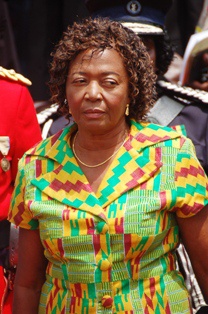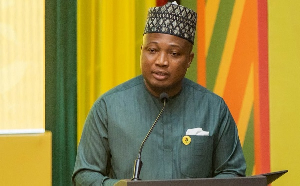Accra, Dec. 16, GNA - First Lady, Dr Mrs Ernestina Naadu Mills, on Friday said Ghana’s maternal mortality rate was unacceptable, and that political commitment must translate into investment of enough resources to help reduce the occurrence of such deaths in the country.
This, she said was crucial as the country prepared to give account on the Millennium Development Goals (MDGs).
“We must be able to report a significant progress on all the MDGs particularly four and five, and we should, therefore, reflect on these issues and play our roles well to make an impact,” the First Lady said.
She was launching the Greater Accra Regional Advocacy Forum with Metropolitan, Municipal and District Assemblies on Campaign for Accelerated Reduction of Maternal Mortality in Africa (CARMMA).
It was on the theme”Ghana Cares: No Woman Should Die While Giving Life”
The CARMMA initiative is a call for action to reduce maternal death, through dialogue, advocacy and communal social mobilisation to ensue commitment, societal change and increased resources in support of maternal health.
Dr Mills said in the face of dwindling international resources domestics resources became critically important for provision of essentials that would ensure the survival of pregnant women.
“For every stakeholder, the death of a woman during birth must be considered a crisis. We can no longer afford to sit and watch our women and children die from conditions which are preventable. Now is the time for a more concerted effort and greater action.”
Dr Bernard Coquelin, UNFPA Representative in Ghana, said mortality rate was directly linked to and dependent on other developmental issues and that by reducing it and achieving MDGs Five in Ghana, other MDGs issues and development challenges should be addressed at the same time.
He said maternal health was not just about numbers going up and down but a basic fundamental human right issue that impacted on human rights of members of a family and society as a whole.
Dr Coquelin noted that of the 100s and 1000s women who died during pregnancy or childbirth each year, 90 per cent were from Africa and Asia; adding that the majority of women died from severe bleeding, infections, eclampsia, obstructed labour and consequences of unsafe abortions.
He said CARMMA recognised the importance of bringing all stakeholders together and forging a broad partnership and consensus on a few interventions that could make a genuine difference over the next few years.
"UNFPA would continue to provide guidance for every woman, man and child to put smiles on their faces and continue to provide leadership in ensuring that Ghana plans effectively using accurate and timely population data for policies and programmes to reduce poverty and most importantly ensuring that every pregnancy is wanted, every birth is safe, every young person is free of HIV and AIDS and every girl and woman is treated with dignity and respect, " he said.
Nii Armah Ashietey, Greater Accra Regional Minister, said the nation needed to redouble its collective and individual efforts to address maternal mortality through campaigns, advocacy and behavioural change.
He charged MMDAs to make conscious efforts to incorporate into their budgets feasible and practical programmes to ensure that no woman died while giving life.
Dr Gloria Quansah Asare, Director of Family Health Division of Ghana Health Service, said if nothing was done to the situation by 2015, Ghana would lose GHc 18 million and it was estimated that 12,000 women would die and 1,000 women would also suffer disabilities.
However, she said, if interventions were put in place they would stem the tide remarkably and called on all stakeholders to put hands on deck to reduce maternal and child mortality to the barest minimum.
General News of Saturday, 17 December 2011
Source: --
Ghana's maternal mortality rate is unacceptable - First Lady













